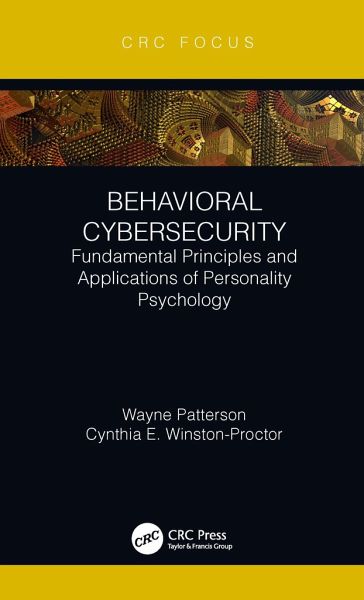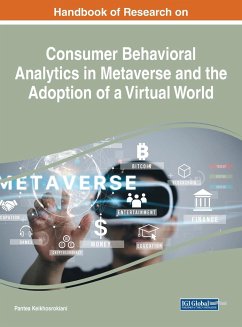Behavioral Cybersecurity
Fundamental Principles and Applications of Personality Psychology
Versandkostenfrei!
Versandfertig in 1-2 Wochen
Weitere Ausgaben:

PAYBACK Punkte
35 °P sammeln!




This book discusses the role of human personality in the study of behavioral cybersecurity for non-specialists.
Dr. Wayne Patterson is a retired professor of computer science from Howard University. He is also currently co-principal investigator for the NSF-funded GEAR UP project at Howard, which has supported almost 300 STEM undergrads to do summer research in 15 developing countries. He has also been Director of the Cybersecurity Research Center, Associate Vice Provost for Research, and Senior Fellow for Research and International Affairs in the Graduate School at Howard. He has also been Professeur d'Informatique at the Université de Moncton, Chair of the Department of Computer Science at the University of New Orleans, and in 1988 Associate Vice Chancellor for Research there. In 1993, he was appointed Vice President for Research and Professional and Community Services, and Dean of the Graduate School at the College of Charleston, South Carolina. In 1998, he was selected by the Council of Graduate Schools, the national organization of graduate deans and graduate schools, as the Dean in Residence at the national office in Washington, DC. His other service to the graduate community in the United States has included being elected to the presidency of the Conference of Southern Graduate Schools, and to the Board of Directors of the Council of Graduate Schools. Dr. Patterson has published more than 50 scholarly articles primarily related to cybersecurity; one of the earliest cybersecurity textbooks, Mathematical Cryptology; and subsequently three other books. He has been the principal investigator on over 35 external grants valued at over $6,000,000. In August 2006, he was loaned by Howard University to the U.S. National Science Foundation to serve as the Foundation's Program Manager for International Science and Engineering in Developing Countries, and in 2017 was Visiting Scholar at Google. He received degrees from the University of Toronto (BSc and MSc in Mathematics), University of New Brunswick (MSc in Computer Science), and University of Michigan (PhD in Mathematics). He has also held postdoctoral appointments at Princeton University and the University of California, Berkeley. Dr. Cynthia E.Winston-Proctor is a widely respected and accomplished narrative personality psychologist and academic. She is Professor of Psychology and Principal Investigator of the Identity and Success Research Laboratory at Howard University. She is also founder of Winston Synergy LLC, a psychology and education consulting firm. Dr. Winston-Proctor earned her Bachelor of Science degree in psychology from Howard University and her Ph.D. in psychology and education from the University of Michigan. Recognized as an outstanding psychologist, research scientist, and teacher, Dr. Winston-Proctor was awarded the National Science Foundation Early Career Award for scientists and engineers, the Howard University Syllabus of the Year Award, the Howard University Emerging Scholar Award, and a Brown University Howard Hughes Medical Institute Research Professorship. Also, she was elected as a member of the Society of Personology, the oldest and most prominent society for scholars to develop, preserve, and promote theory and research that focuses on the study of individual lives and whole persons. As an academic, she has led the development of curricula across a spectrum of areas including undergraduate education in psychology, behavioral cybersecurity, qualitative inquiry in psychology, healthy living for women, culturally responsive computational thinking, and African ancestry education. Her theory and method development-focused research and education scholarship have resulted in publications in numerous journals and edited books, including Culture & Psychology; Qualitative Psychology; Journal of Research on Adolescence; Psych Critiques; New Directions in Childhood & Development; the Oxford Handbook of Cultural Psychology; and Culture, Learning, & Technology: Research and Practice. Dr. Winston-Proctor's professional service includes serving as an editor on the Editorial Board of the American Psychological Association Journal of Qualitative Psychology, President of the Society of STEM Women of Color, Member of the Board of Directors of the Alfred Harcourt Foundation, and Advisor to the Board of Directors of the Howard University Middle School of Mathematics and Science.
Produktdetails
- Verlag: CRC Press
- Seitenzahl: 190
- Erscheinungstermin: 8. Dezember 2020
- Englisch
- Abmessung: 222mm x 145mm x 14mm
- Gewicht: 377g
- ISBN-13: 9780367509798
- ISBN-10: 0367509792
- Artikelnr.: 60019043
Herstellerkennzeichnung
Libri GmbH
Europaallee 1
36244 Bad Hersfeld
gpsr@libri.de
Für dieses Produkt wurde noch keine Bewertung abgegeben. Wir würden uns sehr freuen, wenn du die erste Bewertung schreibst!
Eine Bewertung schreiben
Eine Bewertung schreiben
Andere Kunden interessierten sich für














